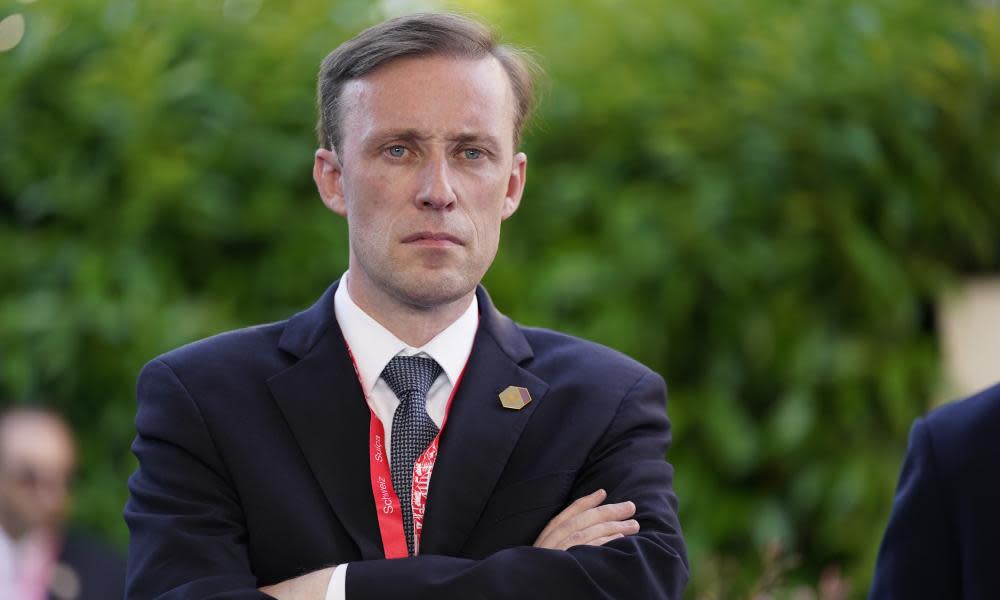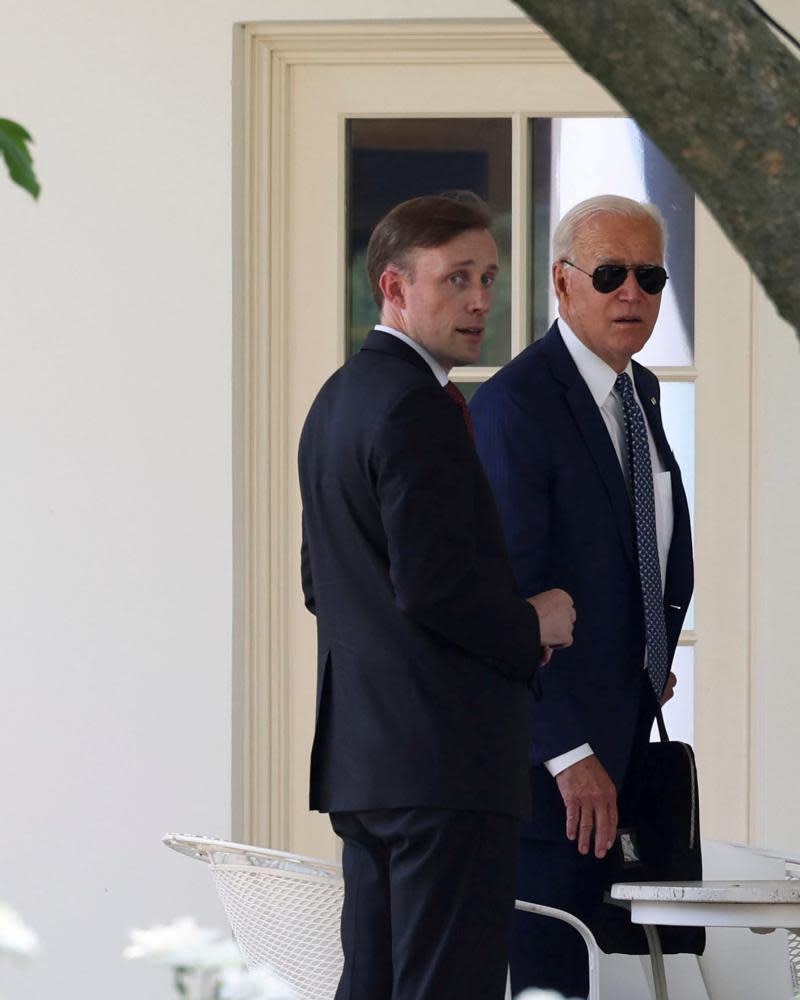Jake Sullivan: the Biden insider at the center of the Afghanistan crisis

- Oops!Something went wrong.Please try again later.
- Oops!Something went wrong.Please try again later.
- Oops!Something went wrong.Please try again later.
- Oops!Something went wrong.Please try again later.
- Oops!Something went wrong.Please try again later.
On the afternoon of 30 August, a White House aide brought a note into the Oval Office confirming that the last US military plane had left Afghan airspace, marking the moment America’s longest war had come to an end.
Joe Biden was with a team of advisers and on receiving the news he asked two of them, secretary of state Tony Blinken and national security adviser Jake Sullivan, to accompany him to his private dining room to mark the moment with a call to the defence secretary, Lloyd Austin.
Blinken has been a constant presence at Biden’s side since 2002. By contrast, before he joined the 2020 campaign, Sullivan had worked for Biden for just 18 months, and that was six years earlier as the then vice-president’s national security adviser. His whole career on the national stage before then had been as Hillary Clinton’s right hand man.
The 30 August phone call – at the president’s side, at the end of two decades of war – was confirmation that he had arrived as a true Biden insider.
“It was a significant moment and the president wanted Jake to be there,” a senior administration official said. “I’ve watched him turn to Jake for advice on both domestic and foreign policy over the last two years. He has enormous respect for Jake’s judgment and relies on him intently.”
Being held close by the president made Sullivan a lead protagonist in a historic moment, but it also put him at centre stage when the blame was hurled for the chaotic and humiliating nature of its final scenes, particularly as it was Sullivan who was sent out to explain the policy on the television talk shows.
The national security adviser is responsible for ensuring all legitimate points of view are aired in the situation room, and all scenarios are examined. But the Biden administration as a whole was taken by surprise by the catastrophic speed of the Afghan army’s collapse.
Eight months into his job, there have been calls for Sullivan’s resignation, and not just from Republicans. Brett Bruen, who was director of global engagement in the Obama White House, went as far as writing a commentary for USA Today calling for a shake-up in Biden’s national security team, starting with Sullivan.
The White House has vigorously defended Sullivan, arguing that no one around the table in the situation room had predicted how fast Kabul would fall, and stressed the national security adviser’s role in coordinating the evacuation of 124,000 civilians, the biggest civilian airlift in US history.
Aged just 44, Sullivan is the youngest national security adviser American has had since McGeorge Bundy counseled John F Kennedy 60 years ago. Everyone interviewed for this article, fan and critic alike, used some variant of “old head on young shoulders” to describe him, saying he was sufficiently secure in himself to be unfailingly polite and thoughtful to those around him.

“Despite being probably one of the smartest people in the building, he’s not somebody who has walled off his process. He’s really interested in hearing what others bring to the table,” Kate Bedingfield, the White House communications director, said.
Sullivan has changed the nature of the President’s Daily Brief, the morning update from the intelligence community, widening the circle of people involved by bringing in more top officials to participate according to their expertise.
Sullivan is not a natural-born creature of Washington. He gave up lucrative opportunities in the capital early in his career to spend more time in Minnesota, where he grew up, and now that he spends almost every waking hour in the White House, he is said to pine for the home he has made in New Hampshire with his wife, Maggie Goodlander, a former adviser to independent (formerly Democratic) senator Joe Lieberman, and the late Republican senator, John McCain.
One of Sullivan’s themes in the job is connecting US actions on the world stage to the lives and welfare of ordinary Americans, with the mantra of “a foreign policy for the middle class”.
A second, overlapping priority has been to finally drag the focus of foreign policy away from the Middle East and counter-terrorism. The withdrawal from Afghanistan and the formation of a security partnership, Aukus, with Australia and the UK, are the two first pillars of that strategy.
“The Afghan decision and the Aukus decision are part of what really is an effort led by Jake, and the president obviously, to bring the country into a post-9/11 foreign policy posture,” Tom Donilon, national security adviser in the Obama administration, said.
“This is a big strategic thing that’s going on here and Jake is the intellectual engine behind it.”
He’s really interested in hearing what others bring to the table
Kate Bedingfield
After practising and teaching law in Minneapolis, Sullivan’s first foray into politics was as chief counsel to Minnesota senator Amy Klobuchar. Klobuchar introduced him to Hillary Clinton, who lured him away to work on her 2008 presidential run.
She drew on his debating expertise (he came second in the 2000 World University Debating Championship in Sydney) to prepare her for her Senate confirmation hearings as secretary of state and for her presidential debates with Donald Trump in 2016.
Sullivan and Philippe Reines, Clinton’s communications adviser who played the part of Trump in those rehearsal debates, became her closest aides.
When she became secretary of state, the two travelled around the world together, with Sullivan notching up 111 countries visited and Reines 110. It became a competition. In the summer of 2012, Reines thought he had gained a point when Sullivan did not appear on a trip to Mongolia, but late in the evening, in the middle of traditional dinner in a large yurt several hours’ drive from Ulan Bator, Sullivan suddenly materialised.
“He somehow managed to find us deep into Asia, where there were no commercial flights of any kind,” Reines recalled.
It was only much later that Reines was informed where Sullivan had been – in Oman with the CIA director, William Burns, in the first secret talks with Iranian officials that ultimately led to the breakthrough 2015 nuclear deal. At the time, Sullivan was 35 years old.
“It just speaks volumes about him that the secretary of state of the United States and the president of the United States thought that he could co-lead the negotiations with one of our strongest adversaries on one of the most difficult issues,” Reines said. “There’s no situation you can put him into that is over his head.”
Sullivan’s critics disagree, pointing out that Sullivan was at the heart of two disasters with long-term fallout: the 2016 election loss to Trump, a campaign in which he played a central role, and the withdrawal from Afghanistan.
He should have learned in 2016 the general lesson that the worst can happen
One of Sullivan’s former colleagues suggested that the factor both debacles had in common was a failure on Sullivan’s part to imagine the worst case scenario.
“He should have learned in 2016 the general lesson that the worst can happen,” the former colleague said.
Donilon said it was unfair and inaccurate to paint Sullivan as a blithe optimist.
He worked on the 2016 campaign with Sullivan and recalled: “He was the person who I had conversations with who was most concerned about the state of that campaign, particularly in the Midwest.”
Bedingfield said the criticism is also inaccurate when it comes to decision-making on Afghanistan.
“I think that’s incredibly misplaced,” she said. “I think numerous participants in the process, from [Chairman of the Joint Chiefs] General Milley to Secretary Blinken to [Director of National Intelligence] Haines, have all said that there was no indication that the Afghan government would collapse in 11 days.”
Douglas London, who was the CIA’s counter-terrorism chief for south and south-west Asia until 2019 and then an adviser on the Biden campaign, insisted that the agency did sound warnings about the possibility that Afghan warlords and militias could switch sides abruptly.
“Trump and Biden received the same assessment: the country could collapse in days or weeks with little notice,” said London, whose book The Recruiter: Spying and the Lost Art of American Intelligence is published next week.
“The Trump White House simply didn’t care. But the Biden White House did not accept the conditions on which that assessment was based as being credible, so dismissed that scenario as unrealistic.”
According to a report in the Wall Street Journal, Sullivan did voice anxiety and question the speed of the withdrawal, and particularly the abrupt abandonment in early July of Bagram airbase, the nerve centre of the US war in Afghanistan for two decades. But Biden ultimately approved the plan.
A White House official said there would be no comment on Sullivan’s advice to the president to “protect the integrity of the process”.
Bruen, who worked in the Obama White House at the same time as Sullivan, argued that the Bagram debate showed he had not shrugged off the instincts of a staffer.
“There is this tendency to be deferential, and that’s the staffer role,” Bruen said. “As a staffer, you are someone whose raison d’etre is to find justifications to support the principal’s position. Your role is very different as a national security adviser. You have to, many times, challenge the president’s views on an issue, help them to see there may be some assumptions they’re making that are wrong.”
However, when a president has made up his mind on a subject, one of Sullivan’s former colleagues said, no national security adviser could stand in the way of the elected commander-in-chief.
“I don’t have any doubt, based on my observations, that Jake Sullivan was clear on his advice,” one of Sullivan’s former White House colleagues said. “It’s very difficult for anybody to penetrate the conversations between the president and the national security adviser, but at the end of the day the president’s views prevail.”

